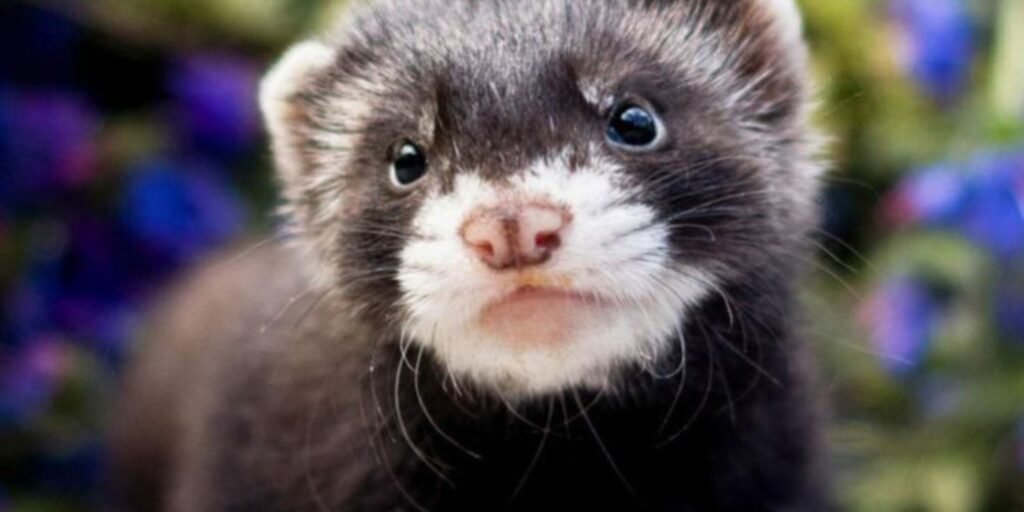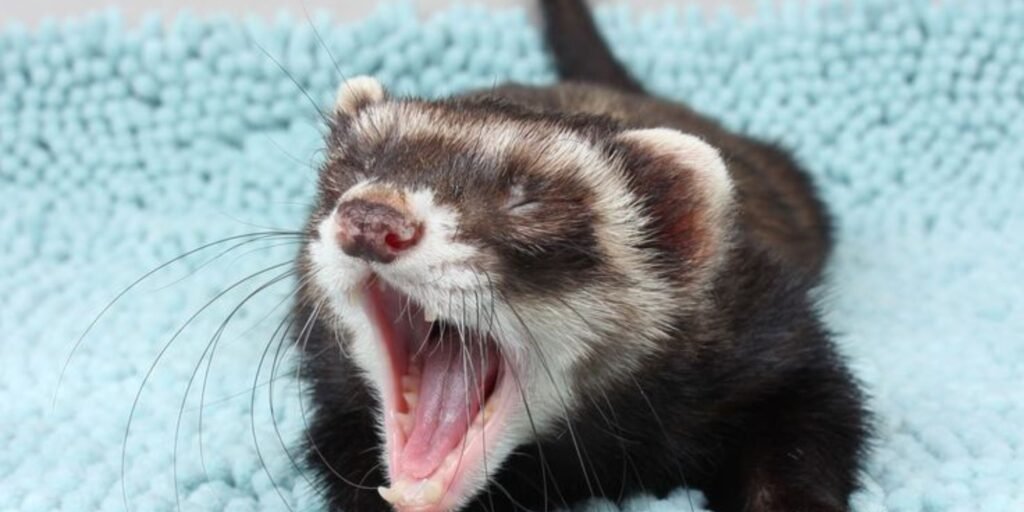Ferrets are often known for their playful personalities and curious nature. They are a popular choice for pets, admired for their energy and affection toward their owners. However, when it comes to their dietary habits, the question arises: Is a ferret a carnivore? This question is significant because it helps us better understand the dietary needs and natural behavior of ferrets. In this article, we will explore the carnivorous nature of ferrets, examining their diet, feeding habits, and the essential nutrients they require to thrive. Additionally, we will look at how ferrets compare to other carnivorous animals in the wild.
Ferrets: A Carnivorous Species
Ferrets (Mustela putorius furo) belong to the Mustelidae family, which also includes other carnivores such as weasels, otters, minks, and martens. As a species, ferrets are obligate carnivores, meaning that their bodies are biologically designed to require a diet consisting mostly of animal-based products. Unlike omnivores or herbivores, obligate carnivores have a digestive system that is specially adapted to break down meat and absorb nutrients from animal sources.
The ferret’s body is lean, with a long, flexible spine and powerful, sharp teeth designed for catching and consuming meat. Ferrets also have a high metabolic rate, which means they require a protein-rich diet to sustain their energy levels. Given these anatomical and physiological traits, it is evident that ferrets are strictly carnivores.
Ferret Diet in the Wild

In the wild, ferrets are known to hunt and prey on small animals such as rodents, rabbits, birds, and even insects. Their sharp claws, keen sense of smell, and high energy levels make them effective hunters, and they rely heavily on animal-based food sources. Wild ferrets primarily hunt small mammals and birds that they can overpower. They use their stealth and agility to stalk and pounce on their prey, capturing and subduing it with their strong jaws.
Ferrets are also opportunistic feeders, meaning they will take advantage of any available food source. If their primary prey is scarce, ferrets will scavenge, hunting for smaller animals or even raiding bird nests. This behavior showcases their versatility and adaptability in the wild. While they may primarily hunt mammals and birds, they are not above eating insects or other smaller creatures if the need arises.
The Carnivorous Diet of Pet Ferrets
Domestic ferrets, despite their long history of domestication, still retain many of the characteristics of their wild ancestors. Their diet in captivity should closely mirror what they would consume in the wild, consisting of animal-based proteins and fats. Ferret owners should ensure their pets are provided with a balanced, meat-based diet to meet their nutritional needs.
Commercial Ferret Food
The most common type of food for pet ferrets is specially formulated commercial ferret kibble. These products are designed to provide all the essential nutrients ferrets need, including protein, fat, vitamins, and minerals. High-quality ferret food typically contains meat-based ingredients such as chicken, turkey, and lamb. These proteins are important because they help ferrets maintain their muscle mass and energy levels. Animal fats are also crucial for providing the necessary calories to support their active lifestyle.
Pet owners should choose fermented food with a high percentage of protein—usually between 30% and 40%—and a moderate amount of fat. Avoiding food with a high percentage of carbohydrates is essential, as ferrets lack the enzymes needed to digest large amounts of plant-based food effectively.
Is a ferret a carnivore? :Raw Diet for Ferrets
Another option for pet ferret owners is feeding their pets a raw diet, sometimes referred to as a raw meat diet or BARF diet (Bones and Raw Food). A raw diet typically consists of a combination of raw meat, bones, organs, and some animal-based supplements. This diet mimics the natural foods a wild ferret would eat, providing them with a variety of meat and fat sources. Raw diets are considered to be the most biologically appropriate option for ferrets, as they offer the right balance of nutrients that ferrets would naturally seek out in the wild.
A raw diet for ferrets may include whole prey animals like mice or chicks, as well as cuts of muscle meat, liver, and bones. Some owners may also offer supplements like fish oil or taurine, which are essential nutrients for ferrets’ overall health. However, it is important to note that a raw diet requires careful planning and understanding of nutritional needs to ensure it is balanced and safe for ferrets.
Treats and Occasional Additions to Diet
While ferrets are obligate carnivores, they can still enjoy a variety of treats that align with their dietary requirements. Occasional treats might include small pieces of cooked chicken, turkey, or even boiled eggs. These protein-rich treats are a great way to enrich a ferret’s diet and provide variety without straying from their carnivorous roots.
It’s important to avoid feeding ferrets fruits, vegetables, or grains, as their digestive system is not equipped to handle plant matter effectively. Offering these types of foods can lead to digestive issues, so it is always best to stick to a meat-based diet for your pet ferret.
Is a ferret a carnivore? :The Nutritional Needs of Carnivores

Carnivores, like ferrets, have unique nutritional requirements that differ from herbivores and omnivores. For ferrets to remain healthy, they need a diet that is rich in animal-based proteins and fats. Let’s explore some of the key nutrients that ferrets require:
Protein
Protein is the most critical nutrient for ferrets, as it helps them build and maintain muscle mass, repair tissues, and support overall growth. A diet high in animal protein is essential for ferrets, as their bodies are not designed to digest plant-based proteins effectively. High-quality protein sources like chicken, turkey, and lamb provide the amino acids that ferrets need to thrive.
Fat
Fat is another essential nutrient for ferrets, providing them with the energy they need to stay active and healthy. Ferrets have a high metabolism, so they burn calories quickly. Animal fats, such as those found in chicken and lamb, provide the necessary caloric intake to support their high energy levels. Fat also plays a role in absorbing fat-soluble vitamins and supporting skin and coat health.
Taurine
Taurine is an amino acid that is particularly important for ferrets. Unlike some other carnivores, ferrets cannot produce sufficient taurine on their own, so it must be included in their diet. Taurine supports heart health, eye function, and overall well-being. It is found in high concentrations in animal tissues, making it an essential part of a ferret’s carnivorous diet.
Vitamin A
Ferrets also require vitamin A, which is essential for vision, immune function, and skin health. Since they are obligate carnivores, ferrets obtain their vitamin A from animal liver, which is rich in this vital nutrient. Unlike herbivores, who obtain vitamin A from plant sources (like beta-carotene), ferrets must rely on animal-based foods to meet their vitamin A needs.
Is a Ferret a Carnivore? : Ferret Behavior and Hunting Instincts
Ferrets are skilled hunters, like other carnivores. Their instincts drive them to chase, stalk, and capture prey. These behaviors are hardwired into their DNA and remain active even in domestic settings. Ferrets often explore and play in their environments, with their curiosity leading them to investigate surroundings as they would in the wild.
Despite their small size, ferrets are adept at chasing and catching prey. Their sharp teeth, strong jaws, and keen sense of smell help them track and subdue animals much larger than themselves. Pet ferrets often display these hunting instincts by chasing toys or engaging in playful “pouncing” behaviors.
Is a Ferret a Carnivore? : Carnivores in the Wild: How Ferrets Compare
Ferrets aren’t the only carnivores in the wild. The Mustelidae family includes weasels, minks, and wolverines. These animals also rely on animal-based foods and share similar hunting behaviors. However, ferrets are unique due to their size, agility, and specific dietary preferences.
Unlike larger carnivores like wolves or big cats, ferrets hunt alone. They rely on stealth and agility rather than group hunting strategies. Their small size allows them to enter burrows and dens to hunt prey, much like minks or weasels.
Is a Ferret a Carnivore? : Conclusion: Ferrets Are Carnivores

In conclusion, ferrets are obligate carnivores. They need a diet rich in animal-based proteins and fats for health and energy. Their natural behavior, dietary needs, and physical traits all point to their carnivorous nature. Whether hunting in the wild or fed by their owners, ferrets depend on animal-based foods to thrive. Pet owners should ensure their ferrets are fed a balanced, meat-based diet to meet their nutritional needs. Whether wild or domesticated, ferrets are fierce and agile carnivores at heart.

